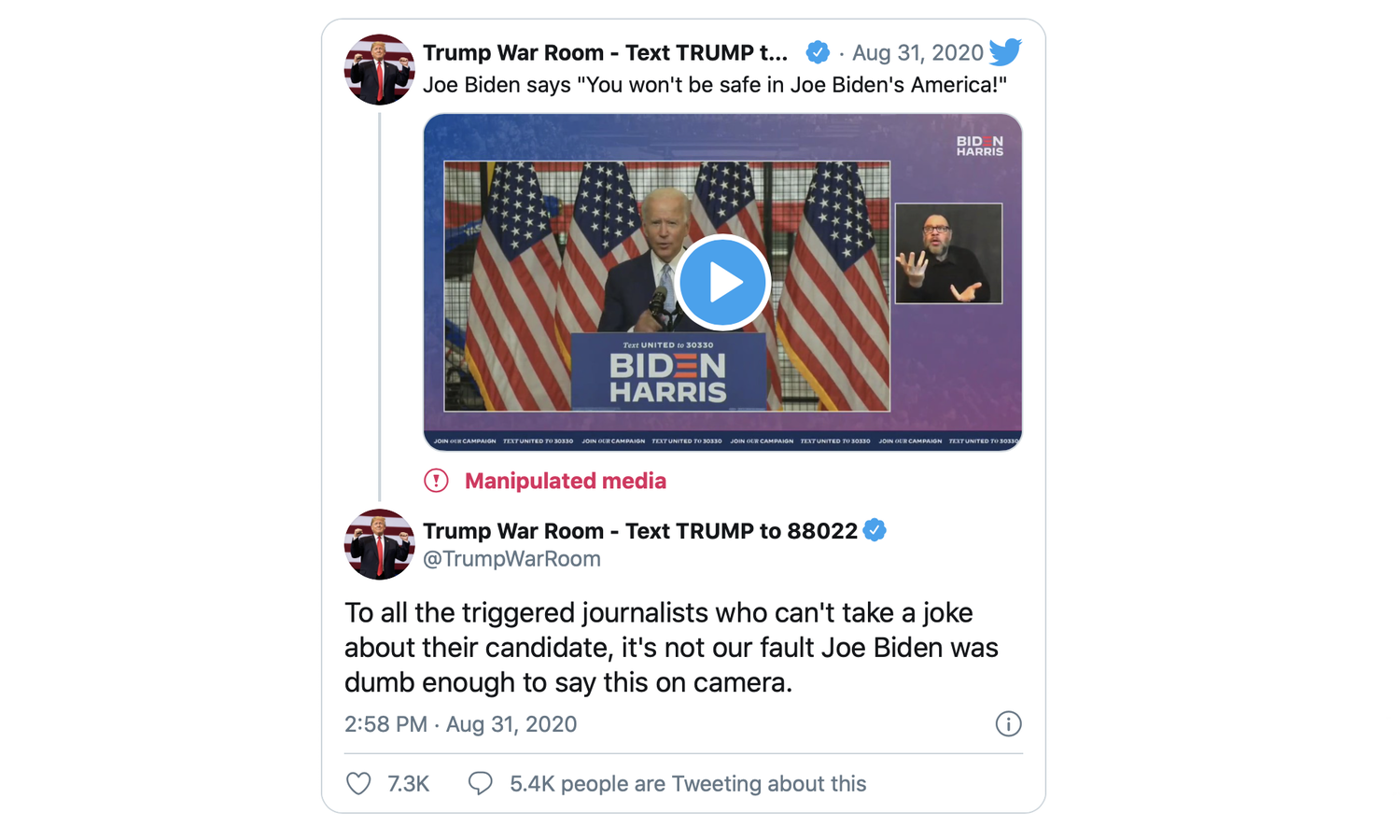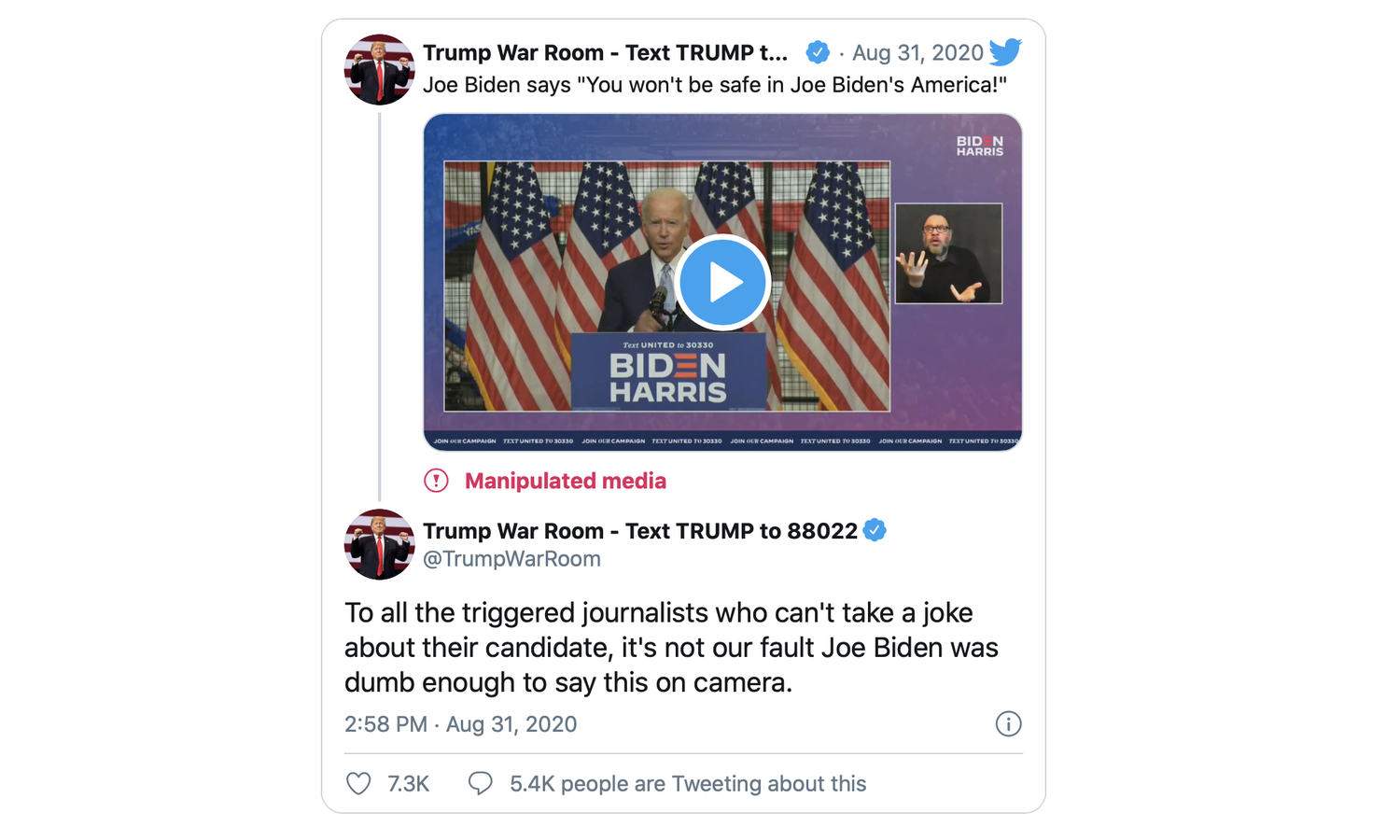The Summer 2020 Developers Alliance US Policy Update.
While summer was slow (per usual), the tech space has stayed in the news. Two years after being passed, California Consumer Privacy Act enforcement went into effect on July 1st. The law has been hailed as the strongest data privacy law in the country — and applies to any company that operates in California. Which, given that California’s economy is about the size of Germany’s, is a lot.
Platform Regulation
Twitter Flags Trump For Promoting Manipulated Media
As election season drags on, the fight of platforms vs politicians continues. As of this week, President Trump’s campaign Twitter account has been flagged for promoting manipulated media. Trump’s campaign responded citing that “triggered journalists (should be able to) take a joke”.
“Big Tech” CEOs Become Congresses’ Big Game
On July 29th, sports came back, at least for Congress, as they questioned the CEOs of Google, Facebook, Amazon, and Apple who appeared (albeit virtually) as witnesses for the latest House Judiciary hearing. The hearing, hosted by the Subcommittee on Antitrust, Commercial, and Administrative Law, was entitled “Online Platforms and Market Power, Part 6: Examining the Dominance of Amazon, Apple, Facebook, and Google.” The hearing involved over 5 hours worth of grilling by members on every aspect of competition within the tech space under the sun, with a particular focus on platform bias and anticompetitive behavior.
The FTC Takes Notices Of Data Portability
The Federal Trade Commission has begun looking into the issue of data portability; accordingly, they put out a request for comments on the potential benefits and challenges to consumers and competition raised by data portability. Check here to see the comments that Developers Alliance submitted in response to the FTC’s request. The Commission will host a workshop on data portability on September 22nd. Developers Alliance plans to be in attendance.
Apple and Epic Games Duke It Out
Epic, the creator of the ever-popular game Fortnite, recently rolled out an in-app mechanism for customers to bypass the Apple store’s payment method. Apple claims this move was in violation of the parties’ existing contract, however, Epic claims that Apple’s payment scheme is in violation of competition law. In response to Epic’s addition, Apple removed Fortnite from their App Store and threatened to cut off the developer tools for the Unreal Engine, the 3D tool and game engine utilized by Epic’s developers to create a variety of projects. While the broader dispute on the competition claim will likely go on for some time, the courts have temporarily ruled that Fornite is allowed to be banned from the App Store, however, Apple is not allowed to cut off Epic Games’ access to developer tools.
FTC Stays Away From Social Media Pursuit
In response to President Trump’s Executive Order back in May regarding social media and online censorship, the FTC Chair Joe Simons stated that his independent agency would not be pursuing any action on the matter as it is outside the purview of the FTC.
White House Rails Against TikTok
The White House released an executive order on August 6th blocking transactions with ByteDance, the parent company of the ever-popular app TikTok. Talks are in place with multiple US companies to acquire the platform, however, TikTok has filed a lawsuit against the administration claiming they are violating their rights of due process. While cybersecurity is a serious matter, we question whether banning transactions with apps outright is a positive move for the ecosystem.
TikTok Must Stop (On Government Devices)
Additionally, the Senate passed the No TikTok on Government Devices Act on August 10th. As its name indicates, the bill would make it illegal for anyone to download the TikTok app on their government-owned device. The bill still needs to be taken up in the House and signed by the President in order to become law.
Senate Commerce Committee Considers Pact
On July 28th the Senate Commerce Committee held a hearing entitled “The PACT Act and Section 230: The Impact of the Law that Helped Create the Internet and an Examination of Proposed Reforms for Today’s Online World.” The hearing examined the history, evolution, and role of Section 230 as it pertains to promoting and disseminating speech online. The hearing was held to provide a discussion on means to platform accountability and moderation, including “what legislative measures, from transparency to accountability tools, can empower consumers online.” The PACT Act and EARN IT Act, two of the bills seeking to remove the Section 230 liability shield for the tech industry, were both discussed at the hearing.
Hawley Goes After BAD ADS
In a further dig at liability for the tech industry, Senator Hawley (R-MO) introduced the BAD ADS Act on July 28th. The act seeks to prevent companies that engage in behavioral advertising from having legal immunity.
Senate Judiciary Committee Decides to EARN IT
Speaking of the EARN IT Act, the Senate Judiciary Committee recently unanimously passed the bill out of the committee stage. Read more about our take on the bill here.
Twitter Tween Hacking Twist
ICYMI: Twitter got hacked by a teen and the world went wild for a brief moment. Lessons learned — talk to your employees about spear-phishing, and ensure that your cybersecurity protocol is up to par.
Your Casual COPPA Reminder For The Summer
Don’t claim you’re part of the Safe Harbor program when you actually are not. The FTC filed a complaint against digital game maker Miniclip for falsely claiming they were part of Children’s Advertising Review Unit’s (CARU) COPPA safe harbor program. With a 5-0 vote for a settlement against the game maker, this is another example of repercussions ensuing when companies do not follow COPPA compliance.
Biometric & Facial Recognition
Senate Looks To Prevent Federal Biometric Aggregation
The Senate referred the National Biometric Information Privacy Act of 2020 to the Judiciary Committee in late June. The proposed legislation, sponsored by Democratic members, is hailed as the strongest biometric privacy law in the country. The proposed bill seeks to “prohibit biometric surveillance by the Federal Government without explicit statutory authorization,” and withhold federal funding from State and local governments that engage in biometric surveillance.
Democrats Mark Concern With Facial Recognition
A group of Democratic members have sent House of Representatives leadership a letter regarding their concerns with facial recognition technology and the disparate impact it has on minority communities. Given the use of facial recognition by law enforcement and the repercussions it would have if widely used, the members request that the 2021 appropriations bill prohibits the use of federal funds for facial recognition technologies.
Misc.
Senators Further Demonstrate Congress’s Encryption Misunderstanding
Meanwhile, Senators question why Twitter doesn’t have end-to-end encryption… while simultaneously pushing for legislation that promotes weak encryption (looking at you, EARN IT Act).
Beyond The Homework Gap
Not every student has access to home internet services. This has serious impacts long term on the developer talent pipeline. So with many students going back to school this fall, COVID or bust, the discussion of remote learning and the Homework Gap has been ever-present. Numerous politicians of late have commented that some type of fix for connectivity needs to be in the next Coronavirus stimulus package. Read more about our take on the homework gap here.
White House Looks To The Future… And Chinese Competition
The White House is feeling the heat from China in the emerging tech space as they recently announced a 30% boost in funding to machine learning and quantum information sciences. Announcing the release, U.S. chief technology officer Michael Kratsios stated: “We need to make sure we’re winning and leading in the technologies of today…and also in the technology that will define our future.”
National Defense Authorization Act Adds Deepfake Report Act As Amendment
Last year’s Deepfake Report Act was added as an amendment to the National Defense Authorization Act (NDAA) that passed the Senate with a veto-proof majority. The House and Senate are still in conference on the final legislation. The provision in the NDAA directs the Department of Homeland Security to conduct an annual study of deepfakes and similar content, as well as requires the Department to “assess the technology used to generate deepfakes, the uses of deepfakes by foreign and domestic entities, and available countermeasures to deepfakes, to help policymakers and the public better understand the threats deepfakes pose to our national security and election security.”






